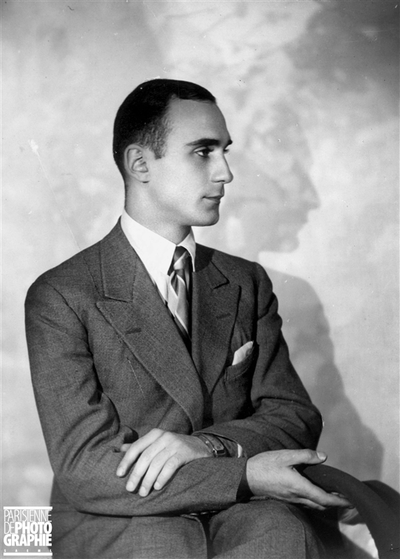BURIED TOGETHER
Partner
Christian Bérard,
Wladimir Augenblick, buried together
Queer Places:
Père Lachaise Cemetery, 16 Rue du Repos, 75020 Paris, Francia
 Boris
Evgenievich Kochno or Kokhno (3 January 1904 – 8 December 1990) was a
Russian poet, dancer and librettist. In Cole Porter (1981), by William McBrien, never-before-seen letters shine light into
Cole Porter's ongoing relationships with Ballets Russes star
Boris Kochno, architect
Ed Tauch,
choreographer Nelson Barclift, director
John Wilson, and
longtime friend Ray Kelly -- whose children still receive half of the childless Porter's copyrights.
Boris
Evgenievich Kochno or Kokhno (3 January 1904 – 8 December 1990) was a
Russian poet, dancer and librettist. In Cole Porter (1981), by William McBrien, never-before-seen letters shine light into
Cole Porter's ongoing relationships with Ballets Russes star
Boris Kochno, architect
Ed Tauch,
choreographer Nelson Barclift, director
John Wilson, and
longtime friend Ray Kelly -- whose children still receive half of the childless Porter's copyrights.
He was born in Moscow, Russia, on 3 January 1904. His father served
as a colonel in the hussars. He studied at the Imperial Lycee in Moscow
before emigrating to Paris in 1920.[2]
Karol Szymanowski’s time
in the dreary surroundings of Elizavetgrad had been temporarily enlivened
by the arrival of a beautiful, teenage refugee from Russia,
Boris Kochno. They had a brief affair
before the composer managed to get him safely out of the Ukraine to
Warsaw. The affair, although fleeting, had a profound effect on the
composer’s life, irrevocably confirming his homosexuality and helping him
to come out in a mood of positive self-belief, at least when abroad.
(Elizavetgrad was another matter.) Not until he visited Paris, late in
1920, did Szymanowski discover what had happened to the boy. He had found
his way to Paris and was now the secretary and lover of Sergei Diaghilev.
He was close with Karol Szymanowski, who gave him as a gift a Russian
translation of the chapter The Symposium from his unpublished novel
Efebos.[3]
Szymanowski also dedicated four poems to him. In 1920 he became
Sergei
Diaghilev's secretary, librettist, and eventually main collaborator.
They were also briefly lovers. Kochno wrote the libretto of
Stravinsky's Mavra (1921),[4]
George Auric's Les Fâcheux (1924),[5]
Henri Sauguet's La Chatte (1927),[6]
and of Sergei Prokofiev's ballet score The Prodigal Son (1929).[7]
In 1925, he had an affair with
Cole Porter,[8]
with whom he carried on a lengthy correspondence.
Upon Diaghilev's death, Kochno and
Serge Lifar
tried but failed to hold the Ballets Russes together. The two inherited
part of Diaghilev's archives and collections, which Kochno completed and
part of which was acquired by the Bibliothèque nationale de France. In
1933 he co-founded, together with
George Balanchine, the short-lived but history-making company Les
Ballets 1933,[9]
which made its debut that summer at the Théâtre des Champs-Élysées. That
same year, he and
Edward James commissioned Brecht and Weill's last collaboration,
The Seven Deadly Sins,[2]
which Balanchine produced, directed, and choreographed.
At the end of World War II, Kochno entered into a partnership with
Roland Petit, with whom he founded the Ballets des Champs-Élysées.[10]
His later career included a position as ballet director with the Ballet
Russe de Monte Carlo, where he became an influential figure in post-World
War II French ballet.
Kochno authored several works, including Diaghilev and the Ballets
Russes, a record of the Diaghilev era, and
Christian
Bérard, a scrapbook of artwork by Bérard, Kochno's former lover
and collaborator, along with reminiscences.
He died on 8 December 1990 in Paris following a fall.[2]
He was buried in the Père Lachaise cemetery in Paris,[11]
next to Wladimir Augenblick (1911–2001).
My published books:


BACK TO HOME PAGE

- https://en.wikipedia.org/wiki/Boris_Kochno
- Woods, Gregory. Homintern . Yale University Press. Edizione del
Kindle.
- Homosexuals in History, A Study of Ambivalence in Society, Literature
and the Arts, by A.L. Rowse, 1977
 Boris
Evgenievich Kochno or Kokhno (3 January 1904 – 8 December 1990) was a
Russian poet, dancer and librettist. In Cole Porter (1981), by William McBrien, never-before-seen letters shine light into
Cole Porter's ongoing relationships with Ballets Russes star
Boris Kochno, architect
Ed Tauch,
choreographer Nelson Barclift, director
John Wilson, and
longtime friend Ray Kelly -- whose children still receive half of the childless Porter's copyrights.
Boris
Evgenievich Kochno or Kokhno (3 January 1904 – 8 December 1990) was a
Russian poet, dancer and librettist. In Cole Porter (1981), by William McBrien, never-before-seen letters shine light into
Cole Porter's ongoing relationships with Ballets Russes star
Boris Kochno, architect
Ed Tauch,
choreographer Nelson Barclift, director
John Wilson, and
longtime friend Ray Kelly -- whose children still receive half of the childless Porter's copyrights.
